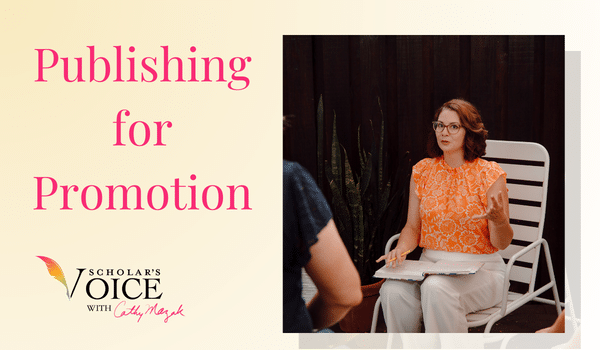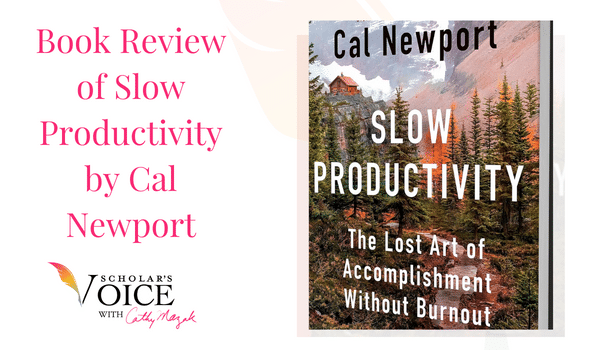What Makes a Writing Practice Sustainable?

What makes a writing practice, or any habit, sustainable? How do you create new practices that stick when the old ones aren’t serving you well anymore?
MORE DETAILS
Creating sustainable practices can be difficult, in writing and in life. Especially when what used to work for you may not work any more. It’s important to begin change from the right place if you want to create a lasting habit and get the results you’re looking for. In this episode I’m sharing some thoughts on sustainable practices, and how to change your mindset to achieve them.
Sustainable Practices Look Different Over Time
There is a saying in the business world that “what got you here, won’t get you there”. The same can be said for writing practices. Maybe when you were a PhD student, you had the ability to do binge writing sessions and had fewer constraints on your time and life. The habits that worked then won’t work now, and finding something that is sustainable in the midst of teaching, service work, or the tenure track can feel overwhelming. It’s important to remember that as circumstances change, our practice will change. Being aware and willing to find a new normal is the first step.
“Sustainable practices are a moving target. They change as your career stage changes.”
Forcing Actions to Achieve Results Isn’t Sustainable
Sometimes we try to change our results by forcing a habit. For example, if we want to write and publish more, we might try to force the habit of writing every day in order to achieve that result.
We might try to draw a line in the sand, and force a way to write every day. But, this usually isn’t sustainable. What happens when the semester hits the fan, you or a family member gets sick, or some other problem throws off your plan?
- Guilt, overwhelm, and negative feelings: “I broke the chain, didn’t stick to my plan, failed.”
- You look to others through accountability. This is a buzzword these days, but to me, trying to find outside accountability is like telling yourself that you are weak, broken, unable to make change yourself and need an outside entity to force you. More negative feelings.
Trying to get the result you want by forcing an action just isn’t sustainable.
“To make sustainable change in your writing practice, what you really need to do is change your thoughts.”
How to Begin the Process for Sustainable Change
In listening to a podcast with life coach Brooke Castillo, I had a lightbulb moment. She explained so well what I am always trying to convey to my clients about how important it is to cultivate our feelings around writing. In order to make lasting, sustainable change in life (including in our writing practices!) Brooke Castillo says we need to approach things like this:
Feelings–>Thoughts–>Actions–>Results
In other words, if you try to get your desired results by forcing an action, like writing every day, but haven’t changed your feelings and your mindset, it will not be sustainable. So, if you are having trouble finding a new sustainable practice where you are now in your career, I want you to try this exercise.
- Sit down, take a moment to reflect, and write down your feelings around writing. What do you think about when you think about writing? About yourself as a writer? As an academic? Be honest with yourself, and write those feelings down.
- If you see negative thoughts and feelings, write down a replacement thought for each one. For example: If you feel that “I’m a bad writer”, come up with something to counter that, like “I passed my dissertation with flying colors”, or “I love to write.” If you have positive thoughts, reinforce them!
- Try a few actions that support your positive feelings, and don’t force anything! Check out Episode 12: Combating Writing Guilt for some ideas to keep the positivity flowing, and actions steps to take.
Our Programs – Get Support for Creating Sustainable Change
Our Amplify program provides trainings, community, group and one-on-one coaching to help you create lasting, sustainable practices to get your desired results. If you are a tenure track woman who wants going up for tenure to feel more like inspiration and less like hazing, click here to learn more.
Our popular Writing Roadmap course is reopening in the Spring. It includes teaching modules, office hours to ask questions, and a facebook group to submit work, get feedback, and make connections with other women in academia. To be notified when sign ups are open, join our mailing list by joining the FB group or emailing support@cathymazak.com.
To get my tips for asking your institution to fund your professional development, check out Episode 7: Securing Professional Development Funding.
Connect with me:
RELATED PODCASTS
Stay current in Academic Publishing
Subscribe to our newsletter:
In the Pipeline
writing tips, publishing trends, reading recomendations, free workshops





